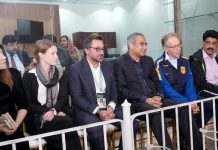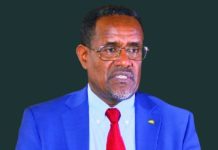KARACHI, DEC 10: Prime Minister Imran Khan on Friday formally inaugurated the Green Line Bus Rapid Transit project in Karachi, with the city’s residents seeing a ray of hope for their notorious public transport woes.
The premier, who arrived in Karachi earlier in the day, was accompanied at the ceremony by senior officials, including Sindh Governor Imran Ismail and federal Planning Minister Asad Umar.
Prime Minister Imran also visited a bus station, where he inspected the infrastructure and also received a briefing on how the ticketing system works.
Addressing the inauguration ceremony, the premier congratulated Umar and the Sindh Infrastructure Development Company Limited (SIDCL) “for pursuing this project with utter determination”.
“No modern city can function without modern transport,” he said, citing the example of hugely populated Chinese cities with effective public transport facilities.
Terming Karachi “Pakistan’s engine of growth”, he said the metropolis’ prosperity had a positive effect on the entire country.
“Making Karachi functional and successful means we are helping Pakistan,” he remarked, calling the Green Line transport system the first step towards building a modern city.
Prime Minister Imran regretted that Karachi’s transport issues were never paid heed to. “I have been seeing Karachi for 50 years. We have seen its transformation into a cave because we did not focus on its administration,” he said.
Quoting the example of the Iranian capital, he said even though the country was under US sanctions, Tehran had modern facilities because of its efficient management.
“Tehran collects $500 million [in revenue] and spends it through planning. In comparison, Karachi doesn’t even collect $30m,” he noted, stressing the need to give Karachi autonomy for the local government system to succeed.
The premier said he was also pursuing the Greater Karachi Water Supply Scheme project, also called K-IV, through coordination with Wapda. The project will be approved by next month following which its groundbreaking will be performed, and it will be completed in 14-15 months.
“By Aug-Sept 2023, we will be supplying water to Karachi from Keenjhar lake,” he said.
‘We don’t just make promises, we deliver’
Earlier, Planning Minister Umar thanked the SIDCL and parliamentarians from Karachi for their efforts for the project. He said the Sindh governor was “supervising” the project since the PTI came to power. In Dec 2020, he said, the SIDCL became a part of the planning ministry and the government started working on the project.
The minister recalled that the project had been approved in 2016, and while the PML-N stayed in power for the next 28 months, the project’s infrastructure was not built.
“The order for the buses was also not placed and neither was the payment system designed; the operation and maintenance tender was also not placed,” he said, adding that the PML-N only thought about building a track surrounded by grills “with no other facilities available”.
“Karachi’s rights were not given to the city in the last three of their (PML-N and PPP’s) governments,” Umar remarked.
Lashing out at the PPP, Umar said the party merely used the name of Sindh, while the PTI-led government actually worked for the province.
Calling Bilawal Bhutto-Zardari an “innocent child”, the minister said the PPP chairman had asked for “time” to work for Sindh. “Dear child, 50 years ago your grandfather was made the chief martial law administrator of the president of Pakistan. How much more time do you need?”
He said the party had formed government in the province six times and four times in the Centre, but still had nothing to show for it.
Commenting on the Karachi Transformation Plan announced by the prime minister last year, he said the scheme included five major projects, one of which — the Green Line project — was being inaugurated today. “Commercial operations will begin on December 25 and total operations will start by January 10,” he announced.
He said that the second project concerned the construction of stormwater drains in the city, adding that work on the Mehmoodabad nullah had been completed and it would be inaugurated in 10 days. The minister further said 50 per cent of the work on the Gujjar and Orangi nullahs had been completed.
Umar said the federal government had also taken responsibility for the K-IV water supply project after it was abandoned, adding that the PC-1 for the project had been submitted to the planning ministry and work would begin within two months.
According to the minister, the Frontier Works Organisation had been mobilised for the Karachi Circular Railway (KCR) project and work had begun on the ground. “Not only local, but international companies are also showing interest in the project,” he revealed.
He remarked that the PTI government was making solid progress on all the projects announced under the transformation programme. “We don’t just make promises, we deliver.”
Green Line project
Work on the Rs16.85 billion federal government-funded bus project had begun after then-prime minister Nawaz Sharif inaugurated it in February 2016 by performing the groundbreaking.
Later, the project was extended by another 10 kilometres as initially sought by the Sindh government and the estimated cost crossed the figure of Rs24bn.
The project was estimated to be completed by the end of 2017, but kept getting new deadlines. Since the launch of the scheme, the battered roads on either side of the route have turned into a great source of nuisance for commuters and for the shopkeepers doing their businesses.
The second and final consignment of 40 buses for the Green Line project arrived in the city on Oct 21, raising the number of buses to 80 and rekindling citizens’ hope that the Bus Rapid Transit System (BRTS) in the metropolis was set to be launched. It is supposed to facilitate the travel of approximately 300,000 passengers daily.
The first batch of 40 buses had arrived in the city on Sept 19 which the planning minister had referred to as a “ray of hope” and “milestone”, calling it the beginning of modern public transport service for Karachiites after a long gap of 40 years.












